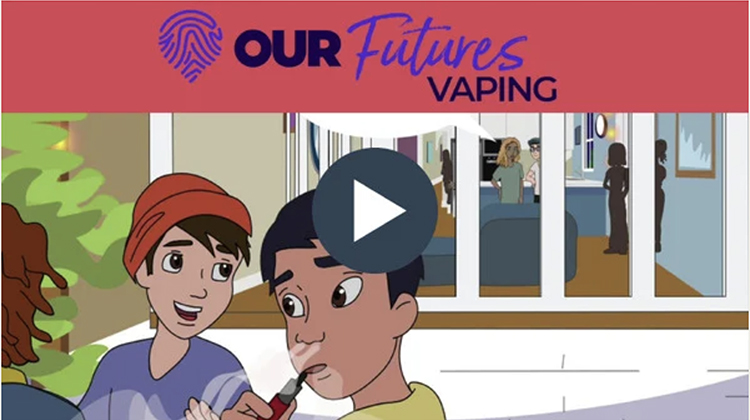School-based Vaping Prevention

After three years of researching and co-designing the intervention with adolescents and school teachers, 5000 high schools students across NSW, QLD and WA are currently enrolled in the OurFutures Vaping Prevention Clinical Trial.
OurFutures Institute’s CEO Ken Wallace says: “Our trial is the gold standard. This is one of the biggest clinical trials of a vaping prevention education program for high school students anywhere in the world.”
Aligned with the Health and Physical Education curriculum, OurFutures Vaping aims to empower young people to learn about the harms of vaping and tobacco cigarette smoking to improve their health and wellbeing.
“Full credit goes to the researchers at the University of Sydney’s Matilda Centre for Research in Mental Health and Substance Use for identifying the need for this resource many years ago, and developing the study protocol,” Wallace says.
“The reality is that some high school students will access substances such as alcohol, drugs, tobacco, and vapes. We know the ‘Just Say No’ approach doesn’t work, so our approach focuses on harm minimisation and empowering youth to make better decisions for themselves. We ask ourselves ‘How do you help young people understand the harms; about assertive communication - equipping them with refusal skills; how to recognise when their behaviour is not good for their own health; how to look after their mates and so on’.
“Our online education courses are developed based on systematic reviews and meta-analyses, and evaluated through large clinical trials. These are what are referred to as top tier evidence. That’s the gold standard that we follow.
“We want to help schools educate young people around challenging topics such as alcohol, drugs, mental health, and vaping. Schools can try to do it on their own but there’s a risk; Prevention education that isn’t highly evidence-based and hasn't been evaluated thoroughly can potentially cause harm, which includes sparking curiosity.”
Early Access Scheme
If found to be effective, OurFutures will have a limited number of schools (up to 250) gain early access to the courses in 2024 (most likely the second half of the year). 20% of slots have already been taken up.
Schools can register their interest for Early Access at https://ourfuturesinstitute.org.au/vaping-program/.
About the Trial
The Matilda Centre at the University of Sydney is conducting the first clinical trial (the gold standard of evidence) of a school-based eHealth prevention program addressing adolescent e-cigarette use in Australia.
The randomised controlled trial involves >5,000 Year 7 and 8 students (aged 12-14 years) from 40 secondary schools across New South Wales, Western Australia, and Queensland.
In the trial, schools are randomly assigned to either the OurFutures Vaping Program intervention group or a control group that receive health education as usual. The schools in the OurFutures Vaping group will receive four weeks of web-based cartoon lessons and accompanying activities during health education classes. While the program primarily looks at e-cigarette use, the program simultaneously addresses cigarette smoking. Students complete online surveys before and immediately after receiving the program (~1 month post-baseline), then 6- , 12-, 24- and 36-months later.
The trial will assess whether students who receive the OurFutures Vaping Program have reduced uptake and use of e-cigarettes, compared to students in the control group, along with any differences in use of tobacco cigarettes, knowledge, attitudes, beliefs and mental health.
About Vaping
Vaping was first introduced as a way to help tobacco addicted smokers quit when first introduced in 2007 but has morphed into a multi-billion-dollar industry with vaping devices and flavours targeted squarely at young people. The National Drug Strategy Household Survey in 2019 found that of the 4204 students surveyed, 10% of 14–17-year-old Australians had tried e-cigarettes. More recent research has found approximately one in four (26%) young Australians have used e-cigarettes.
Many vape liquids contain as much as, or more, nicotine than a pack of cigarettes, and the reality is that vaping is highly addictive and a huge health risk. Nicotine has been found to be harmful to the developing adolescent brain. There are many chemicals in vapes and although some of these have proven safe to eat and drink, they haven't proven safe for inhalation.
And there’s more bad health news … A new study by researchers at the University of Birmingham, UK, has found that even moderate exposure to nicotine-free vapour from e-cigarettes highlights the potentially damaging impact on respiratory health through damage to neutrophils, the body's frontline immune cells, reducing their ability to fight off foreign invaders.
Legislation Designed to Help …
In May, the Federal government pledged $737 million on tobacco and vaping control including $63 million in public health campaigns and $30 million support programs to help people quit and educate health professionals. There’s an additional $140 million to extend the Tackling Indigenous Smoking Program to include vaping. The legislation is planned for this year, but the implementation date has not been announced.
The measures include:
● Total ban on single use, disposable vapes, both with and without nicotine.
● E-cigarettes will be prescription only, intended to aid in the cessation of smoking.
● There will be quality standards restricting flavours, colours and other ingredients as well as a restriction on the amount of nicotine that prescription vapes can contain.
● $63 million will be spent on a public health campaign to discourage smoking and vaping.
● Pharmaceutical-like health warnings on vaping product packaging and restricted marketing and advertising to minimise their appeal to young audiences.
● Support programs and education and training for health professionals and encouraging traditional nicotine replacement cessation methods for vapers and smokers.
● Strengthened border controls with the aim to prevent the illegal importation of vaping products, with severe penalties for unauthorised imports.
● Further research and education initiatives
● State-enforced raids in Perth, Brisbane, NSW, Victoria have confiscated hundreds of thousands of vapes worth millions of dollars.